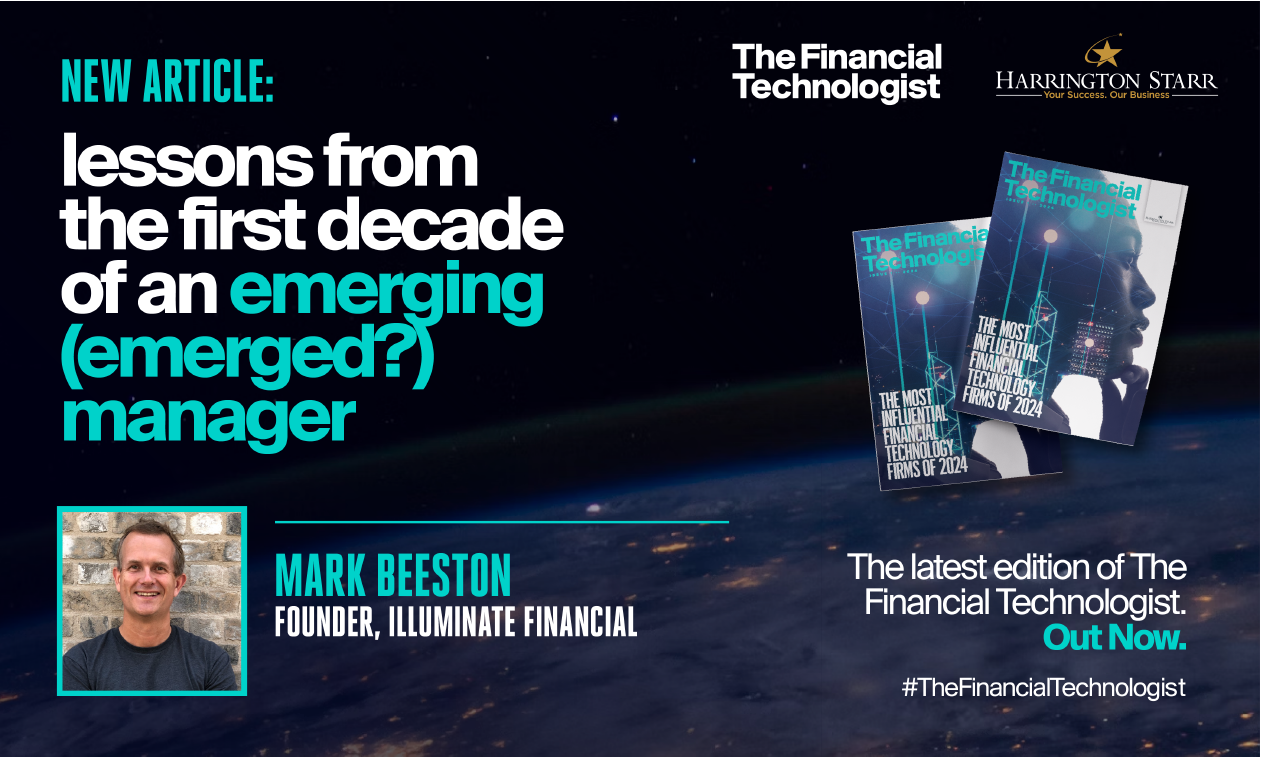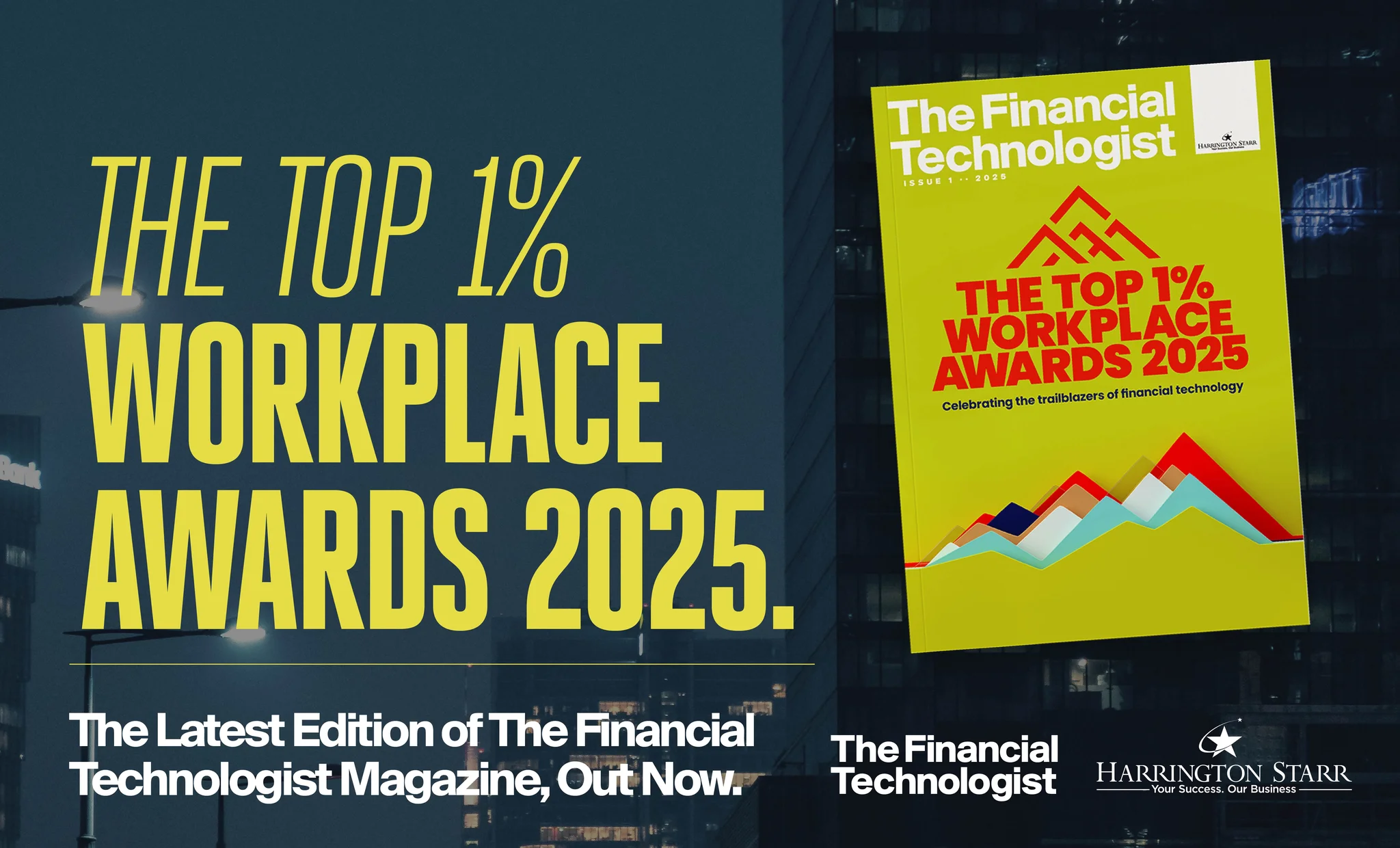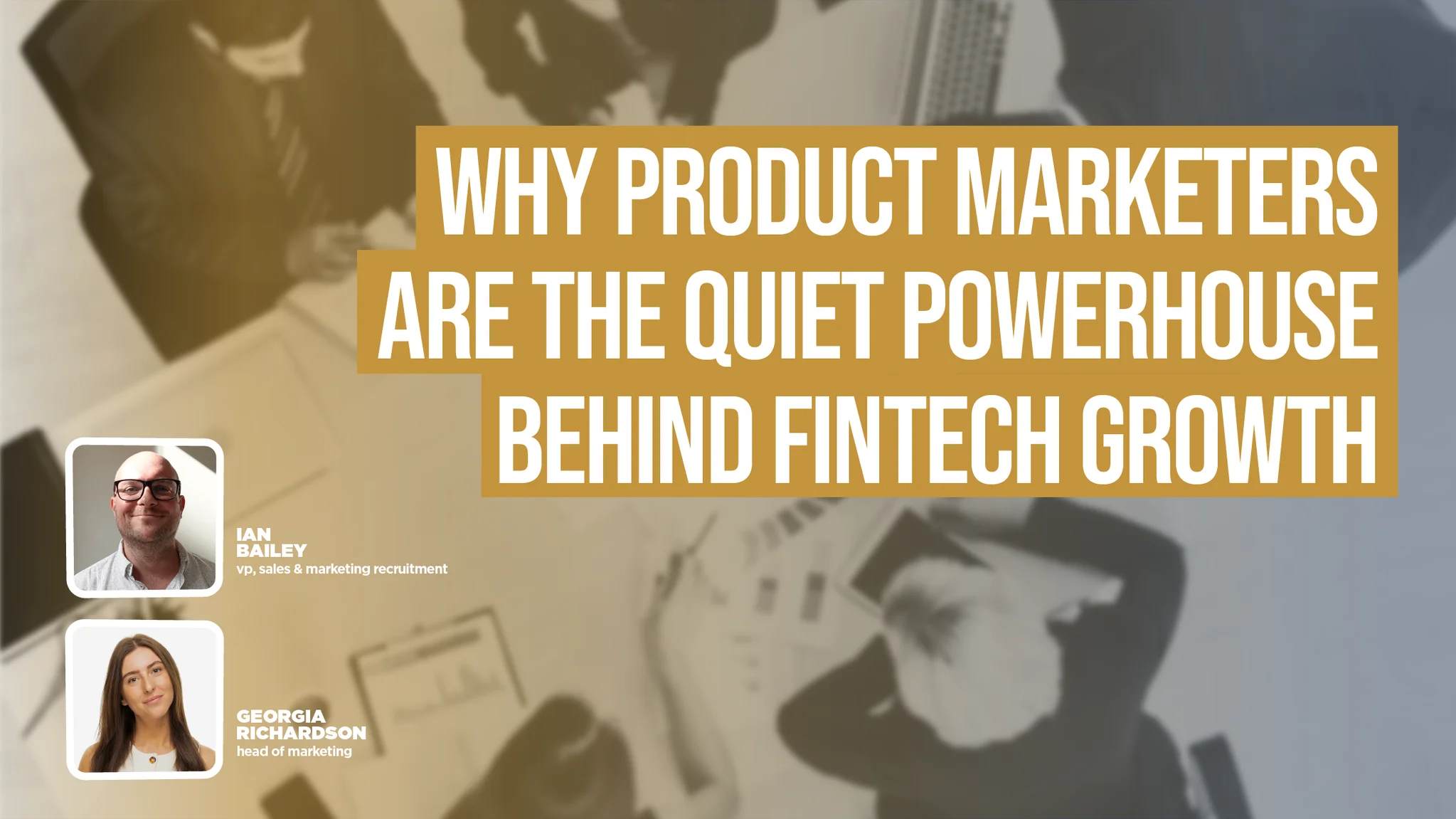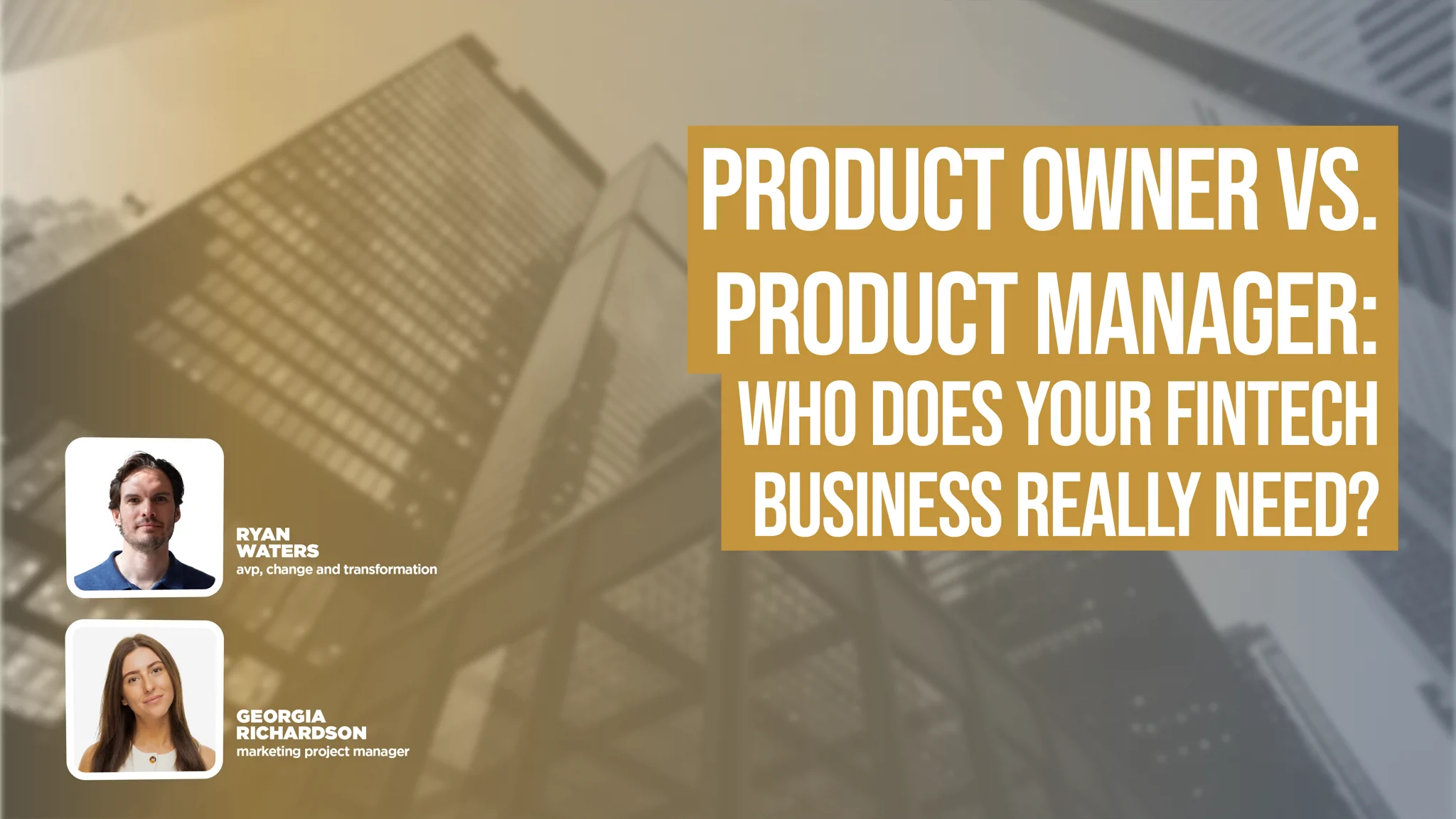Download your free copy of the latest Financial Technologist magazine here.
For me, 2024 started with a LinkedIn update. Specifically, Monday 8th January 2024 marked the completion of my first decade since the launch of our Venture Capital business, Illuminate Financial Management. The post went down well, so I went further, to reveal some of the experiences I picked up and lessons learnt during the last 10 years.
Something I often tell our portfolio founders is that I’m not just a VC, I am a founder too. The reason I make the founder distinction is because I like to say that in our journey together we will follow a road I have been on as a founder, avoid some potholes, and fall into some new ones. But hopefully we can help each other out of the new ones, learn and continue along the road.
I had been in Financial Services for 23 years when I started to launch Illuminate. I joined Deutsche Bank as a graduate and stayed there for 13 incredible years, becoming a fixed income derivatives trader, running global business lines, and ultimately spending my last four years as COO for the Fixed Income and Credit Derivatives businesses sequentially. I sat on many boards of industry consortia, exposing me to what’s now called enterprise FinTech.
I left Deutsche Bank in 2005, joining the exco of Creditex at the same time that TA Associates invested and launching their post trade processing business which culminated with the sale of Creditex Group to ICE Group in 2009. I always say that was my road to Damascus moment; we became the market standard but along the way I had a horrible realisation:
“Was it this difficult to sell me a solution I was actually desperate for when I was the MD at the Financial Institution?”
The answer was yes. What had powered our success wasn’t down to offering over-the-horizon tech, but rather having an industry network willing to adopt the solution so readily. I soon joined ICAP, where I was on the Exco and ran the Post Trade and Information division. Along the way, I met someone who joined me in setting up ICAP’s CVC. Fast forward to 2014, and I left ICAP to set up Illuminate.
The last 10 years of building up a venture firm have taught me some invaluable lessons which I’d like to share with you today.
1. Long term relationships matter (and people invest in people)
Careers take time to build like businesses. So much of that crucial support in the founding of Illuminate came from those I’d developed strong relationships with beforehand, who knew what I believed. These connections would ultimately be willing to take risks to invest in me.
2. Don’t be transactional (Karma is a core value)
Illuminate’s success is built on long term relationships and those relationships are maintained (and often started) when we had or have nothing to “sell” at that moment. I’m a believer in Karma and at Illuminate, we do our bit to help people along the way. Do good and good comes back to you.
3. If you keep repeating something, ask yourself what you are going to do about it?
Illuminate began when I kept hearing myself say, this is a moment of generational change for capital markets infrastructure, but tech is the answer, not the cause. I found my time would be best-spent identifying the solutions to the problems in the macro operating environment.
4. If you hear yourself change your story, ask yourself “why?”
Stories can evolve over time, but if you do find yourself revising them, ask what changed and why? Different memories, or do you have a fundamentally different perspective to the one you used to have? As a case in point, capital markets became institutional financial services for us, reflecting how capital markets aren’t the only place with issues, but rather whole enterprises. Our total addressable market from Fund One grew as a result of this change in perception.
5. Success does NOT breed success by itself (or always be fundraising)
One big mistake I made in the leap from Fund One to Fund Two was treating them as separate events. You have to be constantly marketing your success, or otherwise potential future investors won’t know about it. Blow your own trumpet!
6. Physician heal thyself
Don’t be afraid to critically assess your own company. Is your story compelling? Are materials and the product up to scratch? Is the team and go-to-market good?
7. TEAM TEAM TEAM Part one
All VCs know the team is essential. In a sentence, Illuminate’s network wouldn’t be where it is today without the efforts of the scaled team we grew internally.
8. TEAM TEAM TEAM Part Two (or It Takes a Village)
Building any scalable organisation is about applying the basic economic principle of Comparative Advantage (Ricardo 19th Century) while more recently Metcalf’s law teaches us that networks scale as the square of the nodes both being super relevant to building a Venture team. As a founder, it can be genuinely scary to let go of directly controlling the messaging and external interaction but these are the bonds that tie us to very constrained growth. Illuminate’s network would not be what it is today without the efforts of the scaled team around me, nor would our domain expertise be a fraction of what it is today.
9. The squeaky wheel gets the grease
Determining how to spend your time can feel harder than working out how to optimise capital allocation. VCs are, by their nature, usually constrained in both capital and time. A true value-added investor should spend the bulk of their time chasing the best opportunities which need help.
10. The Power Law Matters
As a former derivatives trader, I’m passionate about managing the balance of risk and return. The two are not mutually exclusive, and it never amazes me how so many investors only care about the ‘X’ multiple you plan to return, without regard for the quality of the ‘X’ at all.
11. It’s a long haul (the irony of Venture)
You might constantly hear the call to ‘fail fast’ in this line of work, but ironically, building a venture firm means the only way to fail fast is to fail in raising a fund at all. Once you do raise one, assuming deployment is always possible, the journey is for the long-term.
12. Nothing will ever taste as sweet as returning your first investor’s capital
First fund investors hold a special place as the ones who backed you from the start. It’s the moment when your firm emerges from its chrysalis and becomes a butterfly at long last. Repaying the faith of these first investors with returns is unlike any other joy.
13. You are going to make mistakes. But that’s OK!
Building anything will carry risks, but then again, isn’t that what life is like too? As a VC, you are likely to make more mistakes than some as part of your job description. Sometimes, they repeat over and over, and (surprise surprise) you might even invest in the wrong place! It happens. It feels painful to get into these scrapes, but no one is perfect and if it was easy, everyone would be a venture capitalist. The solution: don’t punish yourself, but rather learn from mistakes.
14. No one is going to tell you that you have “Emerged”
Last but not least is the interesting philosophical question: when has a VC “emerged” from being an “emerging manager”? To the best of my knowledge, there is no certifying body or at least if there is, I do not yet have a certificate on the wall to say that I (or we) have “emerged” from the primordial soup of emerging venture managers.
The last decade has been a remarkable learning journey and yet amazingly (per point 11), given a fund takes time to raise and a standard fund life is a decade itself, we are not yet even at the end of the first fund lifecycle. I’m excited to think about what the next decade could bring, and what our team can achieve. None of what we’ve done or
will do would be possible without our incredible industry partners, for whom I remain extremely thankful.
Download your free copy of the latest Financial Technologist magazine here.







